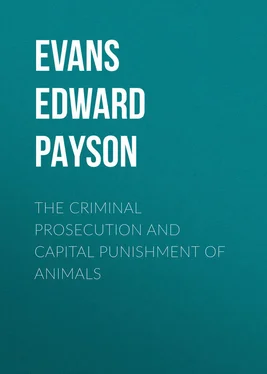Edward Evans - The Criminal Prosecution and Capital Punishment of Animals
Здесь есть возможность читать онлайн «Edward Evans - The Criminal Prosecution and Capital Punishment of Animals» — ознакомительный отрывок электронной книги совершенно бесплатно, а после прочтения отрывка купить полную версию. В некоторых случаях можно слушать аудио, скачать через торрент в формате fb2 и присутствует краткое содержание. Жанр: foreign_antique, foreign_prose, на английском языке. Описание произведения, (предисловие) а так же отзывы посетителей доступны на портале библиотеки ЛибКат.
- Название:The Criminal Prosecution and Capital Punishment of Animals
- Автор:
- Жанр:
- Год:неизвестен
- ISBN:нет данных
- Рейтинг книги:5 / 5. Голосов: 1
-
Избранное:Добавить в избранное
- Отзывы:
-
Ваша оценка:
- 100
- 1
- 2
- 3
- 4
- 5
The Criminal Prosecution and Capital Punishment of Animals: краткое содержание, описание и аннотация
Предлагаем к чтению аннотацию, описание, краткое содержание или предисловие (зависит от того, что написал сам автор книги «The Criminal Prosecution and Capital Punishment of Animals»). Если вы не нашли необходимую информацию о книге — напишите в комментариях, мы постараемся отыскать её.
The Criminal Prosecution and Capital Punishment of Animals — читать онлайн ознакомительный отрывок
Ниже представлен текст книги, разбитый по страницам. Система сохранения места последней прочитанной страницы, позволяет с удобством читать онлайн бесплатно книгу «The Criminal Prosecution and Capital Punishment of Animals», без необходимости каждый раз заново искать на чём Вы остановились. Поставьте закладку, и сможете в любой момент перейти на страницу, на которой закончили чтение.
Интервал:
Закладка:
The case was adjourned to the 12th and finally to the 19th of June, when Petremand Bertrand, the prosecuting attorney, presented a lengthy replication, of which the defendants’ advocate demanded a copy with due time for deliberation. This request led to a further adjournment till the 26th of June, but as this day turned out to be a dies feriatus or holiday, no business could be transacted until the 27th, when the advocate of the commune, François Fay (who seems to have taken the place of Amenet, if he be not the same person), in reply to the defendants’ plea, argued that, although the animals were created before man, they were intended to be subordinate to him and subservient to his use, and that this was, indeed, the reason of their prior creation. They have no raison d’être except as they minister to man, who was made to have dominion over them, inasmuch as all things have been put under his feet, as the Psalmist asserts and the apostle Paul reiterates. On this point, he concludes, our opponent has added nothing refutatory of the views, which have been held from time immemorial by our ancestors; we need only refer to the opinions formerly expressed by the honourable Hippolyte Ducol as satisfactory. The advocate for the defence merely remarked that he had not yet received the document ordered on the 19th of June, and the further consideration of the case was postponed till the 4th of July. Antoine Filliol then made a rejoinder to the plaintiffs’ replication, denying that the subordination of the lower animals to man involves the right of excommunicating them, and insisting upon his former position, which the opposing counsel had not even attempted to disprove, namely, that the lower animals are subject solely to natural law, “a law originating in the eternal reason and resting upon a basis as immutable as that of the divine law of revelation, since they are derived from the same source, namely, the will and power of God.” It is evident, he adds, that the action brought by the plaintiffs is not maintainable and that judgment should be given accordingly.
On the 18th of July, the same parties appear before the official of St. Jean-de-Maurienne. The procurator of the insects demands that the case be closed and the plaintiffs debarred from drawing up any additional statements or creating any further delay by the introduction of irrelevant matter, and requests that a decision be rendered on the documents and declarations already adduced. The prosecuting attorney, whose policy seems to have been to keep the suit pending as long as possible, applies for a new term ( alium terminum ), which was granted.
Meanwhile, in view of the law’s long delay, other measures were taken for the speedier adjustment of the affair by compromise. On the 29th of June, 1587, a public meeting was called at noon immediately after mass on the great square of St. Julien, known as Parloir d’Amont, to which all hinds and habitants ( manants et habitants ) were summoned by the ringing of the church bell to consider the propriety and necessity of providing for the said animals a place outside of the vineyards of St. Julien, where they might obtain sufficient sustenance without devouring and devastating the vines of the said commune. This meeting appears to have been held by the advice of the plaintiffs’ advocate, François Fay, and at the suggestion of the official. A piece of ground in the vicinity was selected and set apart as a sort of insect enclosure, the inhabitants of St. Julien, however, reserving for themselves the right to pass through the said tract of land, “without prejudice to the pasture of the said animals,” and to make use of the springs of water contained therein, which are also to be at the service of the said animals; they reserve furthermore the right of working the mines of ochre and other mineral colours found there, without doing detriment to the means of subsistence of said animals, and finally the right of taking refuge in this spot in time of war or in case of like distress. The place chosen is called La Grand Feisse and described with the exactness of a topographical survey, not only as to its location and dimensions, but also as to the character of its foliage and herbage. The assembled people vote to make this appropriation of land and agree to draw up a conveyance of it “in good form and of perpetual validity,” provided the procurator and advocate of the insects may, on visitation and inspection of the ground, express themselves satisfied with such an arrangement; in witness whereof the protocol is signed “L. Prunier, curial,” and stamped with the seal of the commune.
But this attempt of the inhabitants to conciliate the insects and to settle their differences by mutual concessions did not put an end to the litigation. On the 24th of July, an “Extract from the Register of the Curiality of St. Julien,” containing the proceedings of the public meeting, was submitted to the court by Petremand Bertrand, procurator of the plaintiffs, who called attention to the very generous offer made by the commune and prayed the official to order the grant to be accepted on the conditions specified, and to cause the defendants to vacate the vineyards and to forbid them to return to the same on pain of excommunication. Antoine Filliol, procurator of the insects, requested a copy of the procès-verbal and time for deliberation. The court complied with this request and adjourned the case till “the first juridical day after the harvest vacation,” which fell on the 11th of August, and again by common consent till the 20th of the same month.
At this time, Charles Emanuel I., Duke of Savoy, was preparing to invade the Marquisate of Saluzzo, and the confusion caused by the expedition of troops over Mt. Cenis interfered with the progress of the trial, which was postponed till the 27th of August, and again, since the passage of armed men was still going on ( actento transitu armigerorum ), till the 3rd of September, when Antoine Filliol declared that he could not accept for his clients the offer made by the plaintiffs, because the place was sterile and neither sufficiently nor suitably supplied with food for the support of the said animals; he demanded, therefore, that the proposal be rejected and the action dismissed with costs to the complainants ( petit agentes repelli cum expensis ). The “egregious Petremand Bertrand,” in behalf of the plaintiffs, denies the correctness of this statement and avers that the spot selected and set apart as an abode for the insects is admirably adapted to this purpose, being full of trees and shrubs of divers kinds, as stated in the conveyance prepared by his clients, all of which he is ready to verify. He insists, therefore, upon an adjudication in his favour. The official took the papers of both parties and reserved his decision, appointing experts, who should in the meantime examine the place, which the plaintiffs had proffered as an asylum for the insects, and submit a written report upon the fitness of the same.
The final decision of the case, after such careful deliberation and so long delay, is rendered doubtful by the unfortunate circumstance that the last page of the records has been destroyed by rats or bugs of some sort. Perhaps the prosecuted weevils, not being satisfied with the results of the trial, sent a sharp-toothed delegation into the archives to obliterate and annul the judgment of the court. At least nothing should be thought incredible or impossible in the conduct of creatures, which were deemed worthy of being summoned before ecclesiastical tribunals and which succeeded as criminals in claiming the attention and calling forth the legal learning and acumen of the greatest jurists of their day.
In the margin of the last page are some interesting items of expenses incurred: “ pro visitatione III flor. ,” by which we are to understand three florins to the experts, who were appointed to visit the place assigned to the insects; then “ solverunt scindici Sancti Julliani incluso processu Animalium sigillo ordinationum et pro copia que competat in processu dictorum Animalium omnibus inclusis XVI flor. ,” which may be summed up as sixteen florins for clerical work including seals; finally, “ item pro sportulis domini vicarii III flor. ,” three florins to the vicar, who acted as the bishop’s official and did not receive a regular fee, but was not permitted to go away empty-handed. The date, which follows, Dec. 20, 1587, may be assumed to indicate the time at which the trial came to an end, after a pendency of more than eight months. ( Vide Appendix A Конец ознакомительного фрагмента. Текст предоставлен ООО «ЛитРес». Прочитайте эту книгу целиком, купив полную легальную версию на ЛитРес. Безопасно оплатить книгу можно банковской картой Visa, MasterCard, Maestro, со счета мобильного телефона, с платежного терминала, в салоне МТС или Связной, через PayPal, WebMoney, Яндекс.Деньги, QIWI Кошелек, бонусными картами или другим удобным Вам способом.
.)
Интервал:
Закладка:
Похожие книги на «The Criminal Prosecution and Capital Punishment of Animals»
Представляем Вашему вниманию похожие книги на «The Criminal Prosecution and Capital Punishment of Animals» списком для выбора. Мы отобрали схожую по названию и смыслу литературу в надежде предоставить читателям больше вариантов отыскать новые, интересные, ещё непрочитанные произведения.
Обсуждение, отзывы о книге «The Criminal Prosecution and Capital Punishment of Animals» и просто собственные мнения читателей. Оставьте ваши комментарии, напишите, что Вы думаете о произведении, его смысле или главных героях. Укажите что конкретно понравилось, а что нет, и почему Вы так считаете.












